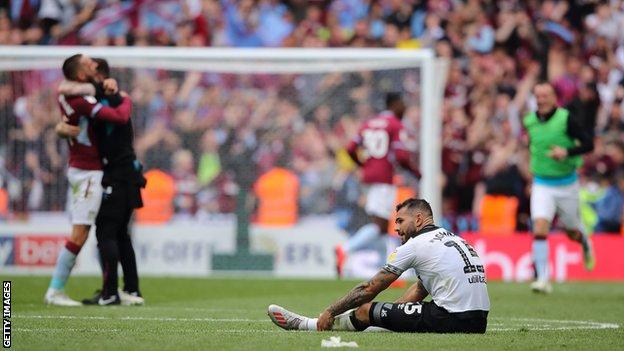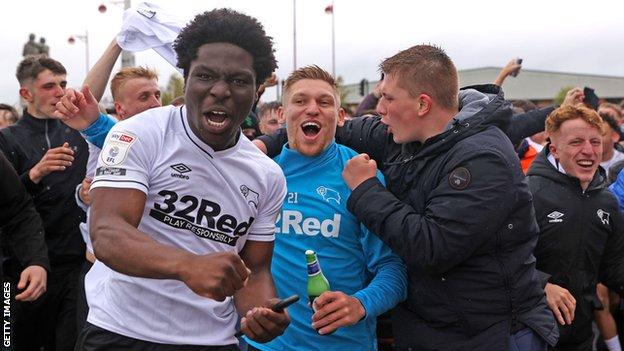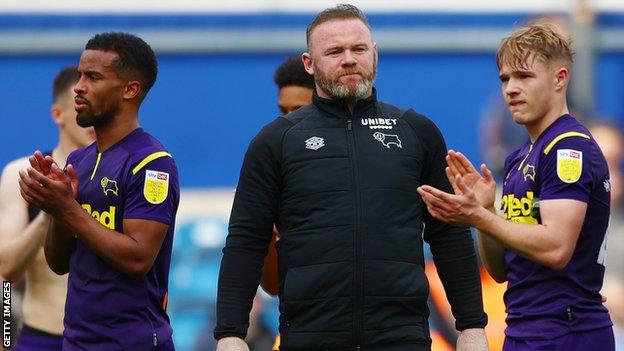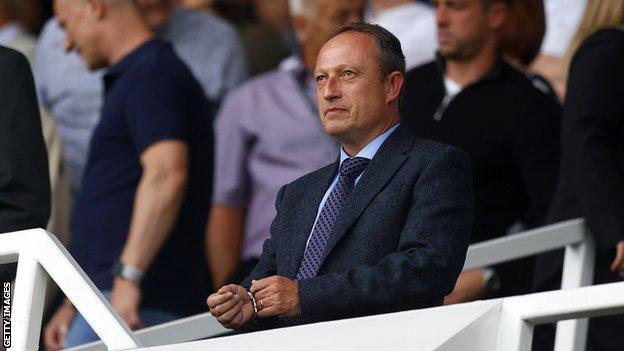Derby County: How one of England's historic clubs was saved from a wild ride to ruin
Last updated on .From the section Derby


Looking back, football finance expert Dr Rob Wilson knew exactly what he was talking about.
"This is last roll of the dice sort of stuff," he told BBC Sport before the 2019 Championship play-off final between Aston Villa and Derby County. "It's winner takes all and loser loses pretty much everything."
Villa won that day at Wembley. Three years on, they spent pre-season on tour in Australia, preparing for a new Premier League campaign with Brazil star Philippe Coutinho in their ranks.
Derby have just begun their first third-tier campaign since 1986, and only the fifth in their history, after local businessman and lifelong supporter David Clowes stepped in to save the club.
Fans must hope the opening-day 1-0 win over Oxford in front of 31,053 at Pride Park on 30 July marks a decisive shift towards a more stable future for one of England's most historic clubs, a founder member of the Football League and twice top-flight champions.
Because the story of Derby's past three years is a wild tale of almost unrelenting bad news, including drunken car crashes, ill-advised social media posts, Financial Fair Play trouble and failed takeovers, all played out before a backdrop of potential ruin.

If former owner Mel Morris knew what losing that play-off final meant for Derby, he wasn't giving anything away immediately afterwards.
Someone who left Wembley with him says Morris was "down but not disappointed". There was a feeling spending would have to be cut but, only a couple of months later, Derby signed Arsenal midfielder Krystian Bielik for £10m. Those at Pride Park who trusted Morris felt the owner must have a plan. He always had a plan.
Wilson had his doubts.
"From an analyst point of view, the writing was genuinely on the wall," he says. "Derby had made successive losses and the accounts were in such bad shape.
"Critics argue if owners want to invest in their business they should be allowed to do so. But if the owner walks away, a club can go bankrupt.
"They were not on their own but Derby were reliant on owner investment. If you look in the auditors' reports there is often a statement to say the auditor is happy to sign them off as a going concern solely on the basis that the owner is prepared to keep investing in the entity. It is there in black and white."
Morris' plan involved Wayne Rooney. Three days after the Bielik deal was announced, it became known that England's record goalscorer would join the club five months later in January 2020.
With former Netherlands midfielder Phillip Cocu replacing Frank Lampard as manager and impressive loan signings Mason Mount, Fikayo Tomori and Harry Wilson returning to their parent clubs, play-off defeat had triggered a summer of change.
But storm clouds were gathering. When they eventually burst, the downpour nearly swept Derby out of existence.

A team bonding session during a midweek off in September 2019 was to have disastrous consequences.
Tom Lawrence crashed his Range Rover into the back of team-mate Mason Bennett's Mercedes as they left the Joiners Arms. They were over the limit and initially fled the scene, along with two other Derby players who were travelling with Lawrence. Skipper Richard Keogh was left unconscious in the back of Lawrence's vehicle.
The fallout from the incident was extensive. Lawrence and Bennett avoided jail but were banned from driving for two years after pleading guilty to drink-driving. Both in their 20s and under contract, they played against Barnsley a week after the incident, having been fined six weeks' wages by Derby.
Keogh, 33, one of Derby's highest-paid players and facing 15 months out of the game because of injuries sustained in the accident, was sacked for gross misconduct.
Derby sources still deny treating Keogh differently to his former team-mates because of their relative financial value. They insist there were specific differences in the conduct of the three men that merited differing outcomes.
Keogh disagreed. He challenged the decision and in May 2021 was awarded £2.3m in compensation. In an interview with the Guardian in October 2021, he said: "It's pretty obvious to most people what happened."
Lawrence remained with Derby until this summer when his contract expired and he joined Rangers. Bennett joined Millwall on loan in the January after the crash. In May 2020, a video was posted on social media in which Bennett says "burn" as he is travelling past Pride Park. He later said it was a private joke which was not intended to be made public. That summer he signed for Millwall permanently.
"There was never a feeling that we were out of the spotlight," one long-serving Derby employee told BBC Sport. "It is hard. Everyone has pride."
The downward spiral had begun. It would soon accelerate.

Derby were charged with breaching EFL financial regulations in January 2020, the month of Rooney's arrival as a player-coach after leaving MLS side DC United.
Although the case initially went Derby's way, the EFL won an appeal against a specific point relating to the amortisation method it used to value its players.
Crucially, that victory was not confirmed until almost a year and a half later, on 11 May 2021. The punishment, a nine-point deduction after the club accepted additional breaches, was not decided until November.
This meant that, at the end of the 2020-21 campaign, Derby remained in the Championship at Wycombe's expense. They had finished one point above them.
As the case was progressing, Morris, who was suffering ill health, had been trying to find a buyer for Derby. After sustaining personal losses on the club of about £200m, he was no longer willing to fund it.
In November 2020 he had agreed a deal in principle with Derventio Holdings, a company owned by an Abu Dhabi national who was said to be a cousin of Manchester City owner Sheikh Mansour. Everything was agreed, contracts were drawn up. The funds were promised. They never arrived.
On 7 April 2021 Morris agreed another deal with Spanish businessman Erik Alonso. That also fell through, but not before Alonso had posted what he hinted was his own property to show evidence of his wealth, which turned out to be a screengrab of a house being sold by an unrelated estate agent in the United States.
With no alternative buyer in sight and Morris unwilling to inject another £15m to cover Covid-related losses on top of the £15m funding shortfall he was already committed to, Derby entered administration on 22 September 2021.
It was a devastating blow, even though concerns around the club had been growing.
At the height of the pandemic in 2020, the club had furloughed staff. At EFL level this was not unusual, but the fact Derby did not top up the 80% of wages received by the government was. Staff did not know it at the time but HMRC bills were also going unpaid. Morris was noticeably less visible. Redundancies meant the club was stripped back. Costs were cut.
When administration came, they were cut even more.
With an additional 12-point deduction automatically imposed after going into administration, survival always seemed unlikely. Relegation was eventually confirmed after defeat at QPR on 18 April this year.
By this point more potential purchasers had come and gone. Former Manchester City chief executive Garry Cook brought one American consortium to the table, but they backed out. Former Derby chairman Andy Appleby led another group. The American Binnie family put a bid forward but were told it was not high enough. The administrators came under sustained criticism for their approach, and ill feeling lingers to this day.
At the same time, legal action from Wycombe and Middlesbrough over alleged losses relating to Derby's overspending caused further problems within the process.
In hindsight, it is felt by some around the club that it would have been better for Derby to have been relegated in 2020-21. Firstly, it would have avoided the Wycombe legal battle. More significantly, while administration would almost certainly have happened anyway, the club's wage bill would have been reduced due to a combination of relegation clauses and player sales. It would have been better placed for a speedier sale.
As Morris still owned the stadium and had more than £20m of liabilities lodged against it, £28m was the generally accepted figure for what was needed to buy the club and pay off creditors, allowing Derby to start the 2022-23 season without another 15-point penalty. To bring the club and the stadium back under the same umbrella would take in excess of £50m.
It seemed no-one was willing to take the plunge until US businessman Chris Kirchner returned to the table four months after withdrawing from talks. He was also closely aligned to Cook and Rooney's long-time adviser Paul Stretford. Kirchner was granted 'preferred bidder' status on 6 April.
For a man on the brink of such an important deal, Kirchner's behaviour was odd. He met Derby fans at a local pub before the home win over Fulham, but when it came to the actual deal he left a lot of the detail to Cook as he flew around the world on other business and travelled to golf events on a private plane.
Despite repeated bullish statements to the contrary and claims of delays in transferring funds, Kirchner withdrew his bid on 14 June. In communication with BBC Sport, Kirchner, who had supplied the EFL with proof of funding, blamed the development on opposition from a board member of his US company Slync.
"It's always one bad apple that ruins the bunch," he said. Answers promised to questions about the source of his personal wealth were not delivered.
Kirchner was suspended from his position as chief executive of Slync on 22 July. He has now deleted his Twitter account. Stretford's company, Triple S, is claiming £1.8m from Kirchner after stepping in to pay May's wages on his behalf.
Fears among fans about liquidation heightened. It looked like a serious possibility. Into this maelstrom stepped Clowes.

Initially Clowes bought the stadium from Morris to make a sale of Derby easier. When the Kirchner deal collapsed, he came forward to buy the club he has supported all his life and, until this season, used to watch from the North Stand.
Clowes is described by those who know him as completely lacking in ego. But he is emotional. He admitted to crying on the Tube in London with his wife after learning the purchase had gone through.
One source told BBC Sport that Derby County has become a byword for "backdoor chicanery and trickery". Clowes wants to change that.
His desire is to make Derby sustainable. It is being stressed that if that means a season or two in League One, that is the way it will have to be. Amid the clear temptation to plough money into his boyhood club, Clowes is described as unlikely to succumb.
On the opening day of the season last week, there was no big introduction before the game. No walk to the centre circle at the ground he now owns. Clowes' media involvement was limited to an interview with the match programme and a chat with the in-house TV station.
Asked what he wanted Derby to stand for, his reply was succinct: "Stability, integrity and progress."
After the past three years, most Derby fans would welcome that.

- How can you save money on meat? Here are some helpful tips on reducing your spend
- Why are some people still unvaccinated? Hannah Fry meets some of them to find out the reasons
























